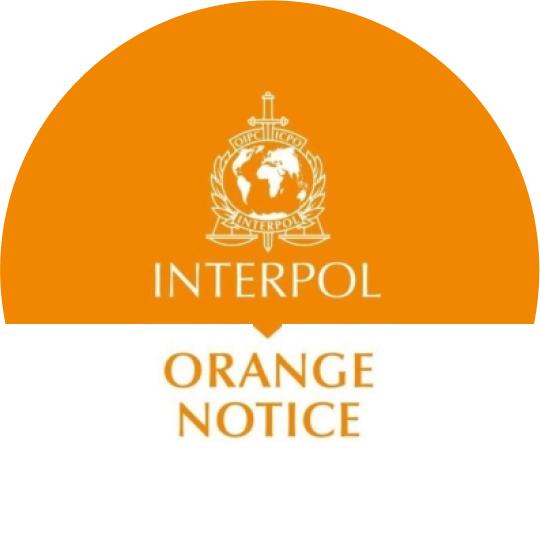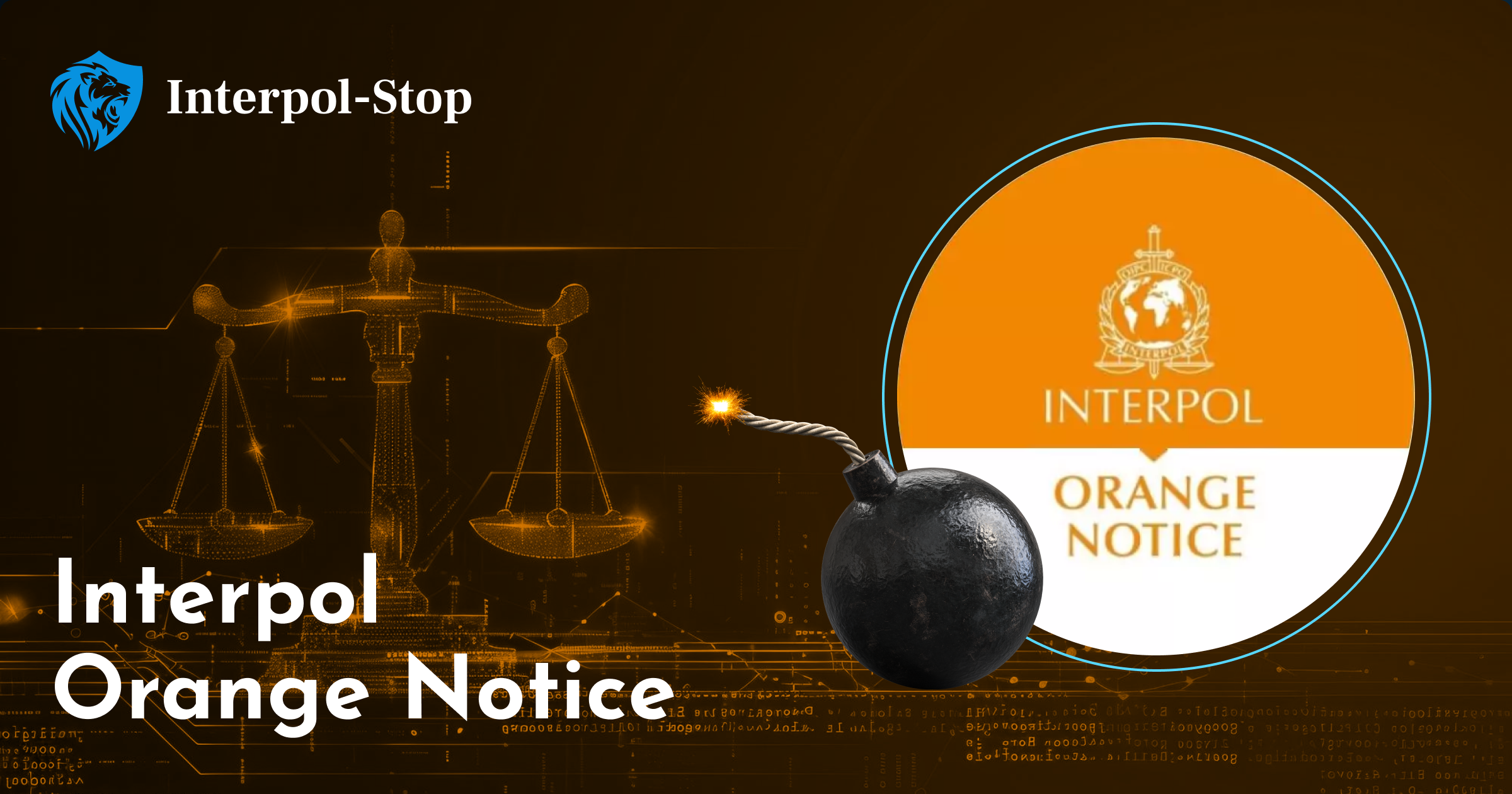
Interpol Orange Notice
Interpol Orange Notice is used to warn of an event, a person, an object, a process, or a place that is believed to pose a serious and imminent threat to public safety. However, this special notice is not an arrest warrant or extradition request but serves as an alert to Interpol member countries to be on the lookout for individuals or entities associated with the potential threat described in the notice.

An orange notice is not an arrest warrant or an extradition request but serves as a warning to Interpol member countries to be on the lookout for individuals or entities associated with a potential threat described in the notice.
These Interpol Notices are international alerts to warn about potential risks associated with certain individuals, objects, or events. These warnings play a crucial role in helping member countries prevent and mitigate threats to public safety.
- About Interpol's Orange Notices
- Issuance and distribution of Orange Alerts
- The process of creating and distributing “orange” alerts
- The Role of Interpol’s National Central Bureaus (NCBs)
- The Impact of Orange Alerts
- Comparison with Interpol's red, blue, green, and other notices
- Coordination and collaboration among various types of notifications
- Interpol Orange Notice FAQ
| Key Points | |||||||||||||||||||
|---|---|---|---|---|---|---|---|---|---|---|---|---|---|---|---|---|---|---|---|
|
Please note that this table provides a simplified overview of Interpol’s Orange Notices. For more detailed information or to address specific issues, it is recommended to consult with an experienced Interpol lawyer or directly contact the relevant authorities.
Interpol’s orange alerts assist international law enforcement agencies by improving information sharing and cooperation between countries. This enhances the global community’s ability to avoid and respond to threats, safeguarding the security of citizens worldwide.
About Interpol’s Orange Notices
An Interpol Orange Notice is issued to alert member countries about potential risks associated with individuals, objects, or events that could threaten public safety, security, or health. The primary goal is to provide information that enables law enforcement agencies worldwide to take preventive or protective measures and to encourage international cooperation.
Types of threats covered by orange alerts
Orange alerts apply to the following types of threats:
- Terrorist acts
- Hazardous chemical substances or materials
- Organizations or networks of criminals
- Cybersecurity threats
- Public health emergencies
Examples of past orange alerts
- Alerts about dangerous criminals or terrorists
- Precautions against the spread of counterfeit drugs
- Information on stolen cultural artifacts
Issuance and distribution of Orange Alerts

Requirements for Issuing an Orange Alert
Interpol issues orange alerts in response to specific conditions, such as the presence of a credible threat and the potential for harm to public safety, security, or health.
The process of creating and distributing “orange” alerts
Typically, the process involves the following steps:
- The member state is requesting an “orange” notice from Interpol.
- The request is being reviewed and verified by the General Secretariat of Interpol.
- An orange notice is prepared and distributed among all member countries through Interpol’s secret communication channels, if it is accepted.
The Role of Interpol’s National Central Bureaus (NCBs)
National Central Bureaus (NCBs) serve as the primary contact points for matters related to Interpol in each member country. They are responsible for receiving and distributing “orange” notices in their regions, ensuring that relevant authorities are notified and necessary actions are taken.
The Impact of Orange Alerts

The ability to prevent and minimize hazards
Interpol’s orange alerts have proven their worth in preventing and minimizing dangers by raising awareness, enabling governments to take preventive measures, and strengthening international cooperation.
Examples of successful outcomes
Numerous “orange” alerts have led to the arrest of dangerous criminals, the prevention of terrorist acts, and the dismantling of criminal networks.
Problems and limitations
Despite their usefulness, “orange alerts” face significant challenges, such as the need for timely and accurate information, varying levels of cooperation between countries, and limited law enforcement capabilities.
Comparison with Interpol’s red, blue, green, and other notices
While orange alerts are aimed at mitigating potential threats, other types of Interpol notices serve different purposes. For instance, the Interpol red notice is an international alert issued to seek wanted individuals pending extradition and legal proceedings over an alleged crime.
Interpol blue notices are issued to determine the whereabouts of a missing person or gather information on criminal investigations, while Interpol green notices are issued to warn about repeat offenders.
Other types of Interpol notices that can be issued include:
- Interpol Black Notices: Issued to seek information on unidentified bodies.
- Interpol Yellow Notices: This notice helps law enforcement agencies locate missing persons, especially minors or people unable to identify themselves.
- Interpol Purple Notices: are used to seek information on the mode of operation, devices, objects, or concealment methods that criminals use in international crime.
- United Nations Security Council Special Notice: This notice is issued to seek individuals or entities targeted by the UN sanctions committees.
Coordination and collaboration among various types of notifications
Interpol notices are designed for collaborative efforts, with each type complementing the others to create a comprehensive system of international alerts. These notices play a crucial role in facilitating cooperation among law enforcement agencies and strengthening global security.






